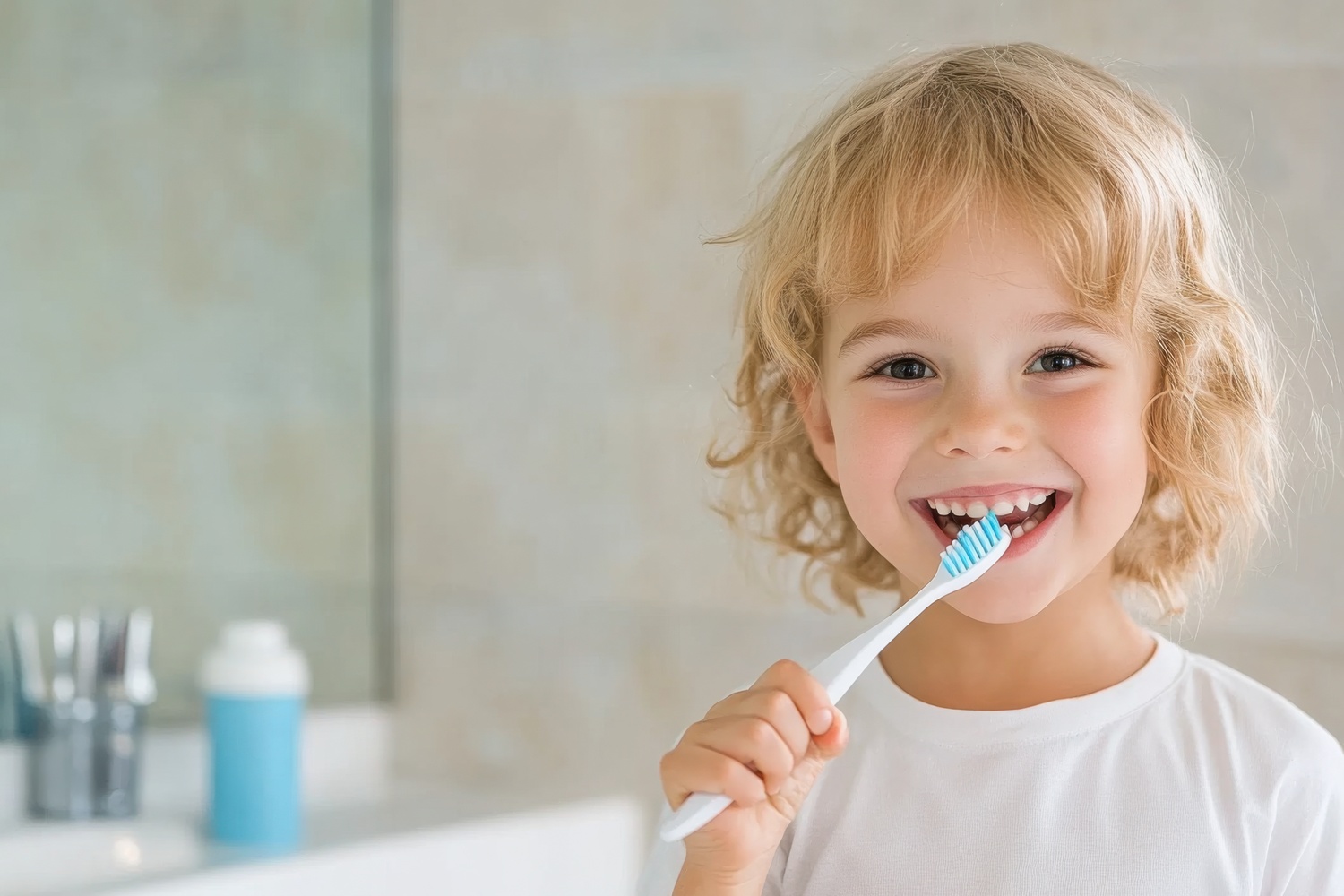Developing good dental habits in children doesn’t happen overnight—it requires consistency, patience, and starting early. While many parents understand the importance of dental care, knowing exactly when and how to begin can sometimes feel overwhelming. At Little Roots Pediatric Dental, our kids dentists in Nassau County believe that establishing proper oral hygiene routines during infancy creates a foundation for lifelong dental health.
Our team of pediatric dental specialists is dedicated to partnering with parents to make dental care a positive part of your child’s daily routine from the very beginning.
Start Before the First Tooth
Oral hygiene begins before your baby’s first tooth even appears. After feedings, gently wipe your baby’s gums with a soft, clean, damp washcloth or gauze pad. This simple practice accomplishes several important things:
- Removes milk residue and bacteria from the gums
- Accustoms your baby to having their mouth cleaned
- Establishes oral hygiene as part of the daily routine
- Helps prepare for the transition to toothbrushing
These early experiences create positive associations with oral care that will serve your child throughout their life.
First Tooth, First Brush
When that first tiny tooth emerges (typically around 6 months of age), it’s time to introduce a toothbrush:
- Choose an infant-sized toothbrush with soft, rounded bristles
- Use a rice-grain sized amount of fluoride toothpaste (yes, fluoride is recommended from the first tooth!)
- Brush gently twice daily, especially before bedtime
- Continue to clean areas where teeth haven’t yet erupted with a washcloth
At this stage, the technique is less important than establishing the habit. As more teeth appear, you can gradually introduce more thorough brushing techniques.
Making Brushing Fun
Children respond best to positive, playful approaches to dental care. Try these strategies to make brushing enjoyable:
- Sing a special “brushing song” that lasts the recommended two minutes
- Use a timer or sand timer to make it a game
- Let your child choose their toothbrush (from age-appropriate options)
- Take turns—let them “brush” your teeth, then you brush theirs
- Read children’s books about dental care and brushing
- Use positive reinforcement with praise and small rewards for consistent brushing
Introducing Flossing
Once teeth begin touching each other (typically around age 2-3), it’s time to introduce flossing:
- Begin with child-friendly floss picks, which are easier for parents to maneuver
- Demonstrate on yourself first
- Keep sessions brief at first, gradually increasing as your child adapts
- Consider making it a family activity where everyone flosses together
Creating Positive Dental Visit Experiences
Regular dental visits are crucial for establishing good oral health habits:
- Schedule your child’s first dental visit by their first birthday or when their first tooth appears
- Choose a pediatric dentist who specializes in treating children
- Use positive language when discussing dental visits
- Avoid using the dentist as a threat (“If you don’t brush, you’ll need to go to the dentist!”)
- Consider morning appointments when children are typically more rested and cooperative
At Little Roots Pediatric Dental, we create a welcoming, child-centered environment that helps children feel comfortable and excited about dental care.
Leading by Example
Children learn by watching their parents. When they see you prioritizing your own oral health, they’re more likely to value theirs:
- Let your child watch you brush and floss regularly
- Demonstrate proper techniques
- Talk positively about your own dental care and visits
- Make oral hygiene a family activity rather than just a “kids’ thing”
Addressing Common Challenges
Even with the best intentions, parents often encounter resistance. Here are strategies for common challenges:
For the reluctant brusher:
- Offer limited choices (“Do you want to use the red toothbrush or the blue one?”)
- Create a reward chart with stickers for consistent brushing
- Try different flavors of toothpaste (while maintaining appropriate fluoride content)
For the independent child:
- Set up a stepstool at the sink so they can see in the mirror
- Let them brush first, then you “finish” for thoroughness
- Supervise brushing until around age 7-8 when manual dexterity is more developed
Nutritional Habits and Dental Health
Establishing good oral hygiene also means developing healthy eating habits:
- Limit sugary snacks and drinks
- Avoid putting babies to bed with bottles containing anything other than water
- Offer water after meals to help rinse away food particles
- Provide calcium-rich foods to strengthen developing teeth
- Choose tooth-friendly snacks like cheese, yogurt, fruits, and vegetables
Partner With Us for Your Child’s Dental Journey
At Little Roots Pediatric Dental, we’re committed to helping your child develop positive attitudes toward dental care that will last a lifetime. Our experienced team provides gentle, specialized care along with practical guidance for parents navigating each stage of their child’s dental development.
For more information about pediatric dental care or to schedule an appointment, contact our office at (516) 738-4434. We look forward to being your partner in establishing healthy dental habits for your child from the very beginning!




